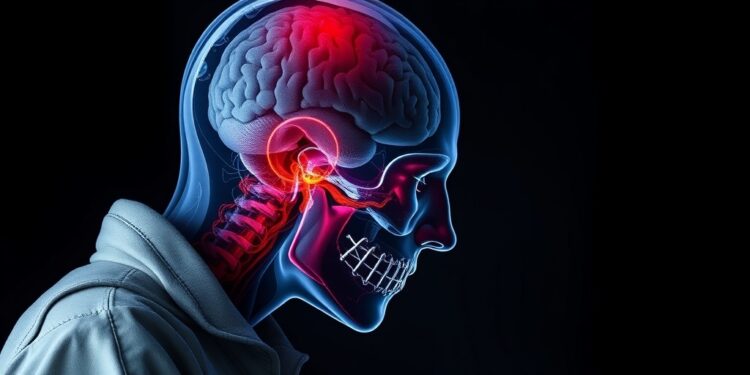Understanding how stress influences the behavioral outcomes of individuals who experience traumatic brain injury (TBI) has emerged as a critical area of research, particularly within military contexts where TBI is significantly prevalent. A study conducted by researchers at Virginia Tech and funded by the US Department of Defense has unveiled a complex interplay between prior stress exposure and TBI outcomes in a manner that varies based on sex. Led by Pamela VandeVord, this research emphasizes the necessity of addressing pre-existing conditions such as stress and considering sex differences in the treatment and rehabilitation of TBI.
The research team utilized an unpredictable stress paradigm to assess its effects on rats before inducing TBI through a methodology that simulates the blast-related brain injuries experienced in combat scenarios. By drawing comparisons between five different groups—those exposed to stress only, TBI only, both stress and TBI, and a control group without exposure—researchers could evaluate the behavioral changes resulting from these conditions. This rigorous experimental design aimed to mimic the multifaceted trauma often faced by military personnel, thereby enhancing the study’s applicability to human conditions.
The findings revealed significant behavioral outcomes that were influenced by both the presence of prior stress and the sex of the rats. Males that experienced both stress and TBI exhibited elevated anxiety levels compared to those that endured TBI alone, presenting a noteworthy example of how stress exacerbates negative outcomes following injury. Surprisingly, the combined experiences of stress and TBI did protect certain aspects of social motivation in male subjects, indicating that stress may have nuanced effects rather than outright debilitating consequences. This aspect of the study calls for a reevaluation of how stress is perceived in relation to potential protective behavioral adaptations.
Contrastingly, the female rats showed a conflicting response pattern, particularly concerning social motivation. Females subjected solely to TBI emerged as the most socially motivated of all female groups, illustrating a unique resilience that was not observed in their male counterparts. The females who experienced both stress and TBI displayed heightened anxiety levels akin to males, yet their social motivation was largely diminished compared to females undergoing TBI alone. This pivotal observation indicates that the physiological and psychological ramifications of TBI may affect males and females differently, underscoring the relevance of sex as a crucial variable in TBI research.
VandeVord’s research showcases the importance of incorporating pre-existing stress conditions into models assessing TBI outcomes. The data suggest that psychological factors preceding a physical injury can critically modify behavioral responses, demonstrating the bidirectional influence between mental health and physical trauma. As such, the research advocates for a comprehensive approach to TBI treatment, one that integrates psychological evaluations and stress management interventions into rehabilitation programs.
In terms of methodology, the unpredictable stress paradigm utilized in this study helps establish a framework for investigating the profound effects of stress in laboratory settings. By simulating real-world stressors, researchers can gain insights that are more reflective of human experiences, particularly within high-stress environments like military operations. This methodological rigor adds depth to the study’s findings, reinforcing the notion that understanding the intricacies of brain injury and mental health interactions is essential for developing effective therapeutic strategies.
The implications of this research extend far beyond the confines of the laboratory. With a growing recognition of the prevalence of TBI among military personnel, there is an urgent need for evidence-based interventions that address both the psychological and physical aspects of recovery. Policymakers and healthcare providers must take heed of these findings, advocating for integrative treatment modalities that focus not only on the physical injury but also on the mental health aspects influencing recovery trajectories.
Additionally, the study highlights the necessity for future research to explore other potential variables that might influence outcomes following TBI. The emphasis on sex differences alone prompts a broader inquiry into how age, pre-existing mental health conditions, and the type of stressors experienced may alter behavioral outcomes post-injury. It opens new avenues for exploring personalized treatment approaches rooted in an individual’s unique history and physiological makeup.
The study has been published in the acclaimed journal eNeuro, reflecting its scientific validity and relevance in the field of neuroscience. This publication underscores the commitment of researchers to disseminate knowledge that could enhance both clinical practice and research paradigms associated with TBI and stress. The findings serve as a constructive addition to the literature on neurotrauma, stressing the importance of context in understanding mental and behavioral health following injuries.
Furthermore, in a landscape characterized by an increasing recognition of mental health challenges in military personnel, findings such as these are invaluable. They align with ongoing efforts to destigmatize psychological concerns and advocate for holistic approaches to health and recovery. Continued exploration of the connections between stress, TBI, and behavior will deepen our comprehension of these crucial relationships and inform strategies aimed at enhancing the lives of affected individuals.
In conclusion, the intricate relationship between stress, sex, and traumatic brain injury underscores the need for nuanced and comprehensive approaches in both research and clinical practice. As we continue to confront the challenges posed by TBI, the insights derived from this study promise to inform better outcomes for individuals facing these debilitating conditions, particularly those in the high-stress milieu of military service. The call to action is clear: researchers, clinicians, and policymakers must collaborate to ensure that interventions account for the complexity of human experiences, fostering resilience and recovery among those impacted by TBI.
Subject of Research: The effects of prior stress exposure on behavioral outcomes following traumatic brain injury (TBI) in a sex-dependent manner.
Article Title: Exposure to Acute Psychological Trauma Prior to Blast Neurotrauma Results in Alternative Behavioral Outcomes
News Publication Date: March 17, 2025
Web References: http://dx.doi.org/10.1523/ENEURO.0026-24.2025
References: [None provided]
Image Credits: [None provided]
Keywords: Traumatic Brain Injury, Stress, Anxiety, Social Motivation, Sex Differences, Military, Neuroscience, Behavioral Outcomes, Psychological Trauma, Recovery, Mental Health, Research.




